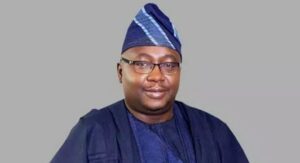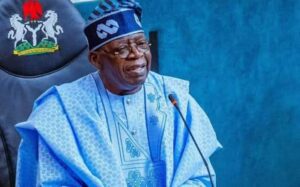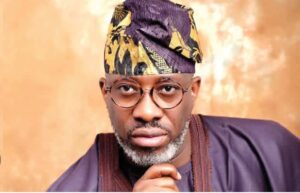Who is Peter Obi?
By Moses Adeniyi
As the pulse for another general elections begins to rise, the vistas of perusing the political climate for a prognosis towards the expectations remain significant. Such analysis becomes necessary to prepare the minds of Nigerians to the likely candidates who would be in better position to occupy several positions to be opened for contest. This has become particularly essential at a time it only behooves the populace to sniff for square pegs in square holes. Given the pressing state-of-the-nation, the first point in the frame of reckon in the discourse of the general elections has been known to be the seat that houses the number one position of the Nigeria as a Country – which is the presidency.
Perusing the political climate at a time when candidates from various sections of the Country are declaring their ambitions to run for the seat in question has become sine qua non, and has thus, recently dominated political discourse. Since the argument to shift power by rotational principle has become a frontal political debate as the nucleus for the 2023 presidential seat, giving considerations to run the profile of strong personalities fit for the contest from the Southern part of the Federation has become necessary. One would, however, want to take a recourse to the 2019 elections for a clue from the candidates who were at the fore-front of the contest. One of such is a political juggernaut from the eastern part of Southern Nigeria who recently was threatened with lawsuit for delaying his intention to declare aspiration for the office of the number one citizen of the Country. Peter Obi, a former Governor of Anambra State, and the vice presidential candidate of the Peoples Democratic Party in the 2019 election, had on January 16, 2022, in response to a tweet by one @FakeBuhari, threatening to sue him if he fails to declare for the presidency in 2023, had pleaded with the fan to give him time to consult, saying that he had no money for a court case. Obi, in a response to the tweet had said, “I wish I knew your real name. But the truth is, I don’t have money to spend on a court case. Give me some time.”
@FakeBuhari had tweeted earlier, “Sir, if at the end of this month and you don’t declare interest for the presidency in the 2023 election, then be ready for legal action from me. Leave #AFCON2021 for Orji UZOR Kalu, that’s his calling, not yours. Your calling is excellent economic leadership. Congrats #TeamNigeria.”
The subject of discourse here has become one of thought to consider his profile as a candidate of reckon for the race, should his intention be made known. Peter Gregory Obi, born on 19th, July 1961, has maintained a competitive strength as a Nigerian politician and businessman. He contested as the vice presidential candidate in the 2019 general election under the Peoples Democratic Party (P.D.P) with former Nigerian Vice President, Atiku Abubakar; a team that stood at the height of the closest contestant to President Muhammadu Buhari, the All Progressives Congress (APC) candidate. Obi served as Governor of Anambra State from 17th, March 2006 to 2nd November 2006, when he was impeached but subsequently emerged victorious and served from 9th February 2007 to 29th May 2007 after his impeachment was overturned. Following a fresh election held on 29th, April 2007, Obi was re-elected Governor on 14th, June 2007 after a court ruling that he should be allowed to complete a four-year term. He won the February, 6th, 2010 gubernatorial election making him serve as two term Governor of Anambra state.
Obi’s Political Adventure
Obi’s strength in politics took a record of note when he contested in the Anambra State governorship election as candidate for the All Progressives Grand Alliance (APGA) party in 2003, but his opponent, Chris Ngige of the Peoples Democratic Party, was declared winner by the Independent National Electoral Commission (INEC). After about three years of litigation, Ngige’s victory was overturned by the Court of Appeal on the 15th March 2006. Obi took over office on 17th, March 2006. On 2nd November 2006, he was impeached by the Anambra state house of assembly after seven months in office and was replaced the next day by Virginia Etiaba, his deputy. Obi successfully challenged his impeachment and was re-instated as the governor on 9th, February 2007 following his justification by the Court of Appeal sitting in Enugu.
Obi once again left office on 29th May 2007 following the general elections, which Andy Uba won. Obi returned to the court again, this time contending that the four-year tenure he had won in the 2003 elections only started to run when he took office in March 2006. On 14th, June 2007 the Supreme Court of Nigeria upheld Obi’s contention and returned Obi to office. This brought to an abrupt end the tenure of Obi’s successor, Andy Uba whose 14th, April, 2007 election the Supreme Court nullified on the grounds that Obi’s four-year tenure should have remained undisturbed until March 2010.
On 7th, February 2010, INEC declared Obi the winner of the 2010 Anambra State gubernatorial election, where he defeated Professor Charles Chukwuma Soludo, former governor, CBN, and winner of 2021 Anambra State gubernatorial election. This election victory gave Obi an additional four years as the governor of Anambra State. On 12th, October 2018, Peter Obi was named as the running mate to Atiku Abubakar, PDP’s Presidential Candidate in the 2019 Presidential elections.
Education
Obi’s education profile reads: Christ the King College, Onitsha (W.A.S.C.); University of Nigeria, Nsukka (B.A. Philosophy); Lagos Business School, Nigeria (Chief Executive Program); Harvard Business School, Boston, U.S.A. (Mid to Mid Marketing); Harvard Business School, Boston, U.S.A. (Changing the Game); London School of Economics (Financial Mgmt/Business Policy); Columbia Business School, New York, U.S.A. (Marketing Mgmt); Institute for Management Development, Switzerland (Senior Executive Program); Institute for Management Development, Switzerland (Break-Through Program for CEOs); Kellogg Graduate School of Management, U.S.A. (Advanced Executive Program); Kellogg School of Management U.S.A. (Global Advanced Mgmt Program); Oxford University: Said Business School, (Advanced Mgmt & Leadership Program); Cambridge University: George Business School (Advanced Leadership Program).
Professional Organisation membership and Service in Committees
Obi is a Member, Nigerian Economic Summit Group (NESG); Member, Nigerian Chartered Institute of Bankers; and Member, British Institute of Directors (IOD).
Federal Government Committes on which Obi has served include: Federal Government Committee on Minimum Wage; Federal Government Committee on Negotiation with Labour on Subsidy; Federal Government Committee on Mass Transit; Federal Government Committee on Natural Resource; National Economic Council Committee on Power Sector Reform; National Economic Council Committee on Sharing of MDGs Funds; National Economic Council Committee on Accurate Data on Nigeria’s Oil Import and Export; Agricultural Transformation Implementation Council; Sub-Committee on Needs Analysis of Public Universities in Nigeria; National Economic Council Review Committee on the Power Sector.
Experience in the Organised Private Sector
Obi has served in various capacities as a key stakeholder in the organised private sector including as Chairman of Nigeria Security and Exchange Commission, chairman of Next International Nigeria Ltd, chairman and director of Guardian Express Mortgage Bank Ltd, Guardian Express Bank Plc, Future View Securities Ltd, Paymaster Nigeria Ltd, Chams Nigeria Ltd, Data Corp Ltd and Card Centre Ltd. He was the youngest chairman of Fidelity Bank Plc. He was appointed the chairman of the Security and Exchange Commission (SEC) by former President Goodluck Jonathan after the 2015 general election.
Highlights of Obi’s Awards include
Sun Newspaper’s Man of the Year (2007); Thisday Newspaper’s Most Prudent Governor in Nigeria (2009); Champion Newspaper’s Nigeria’s Most Trustworthy Governor (2009); West Africa ICT Development Award for Governor of the Year (2010); Zik Leadership Prize (2011); Bill & Melinda Gates Foundation’s Best Performing Governor on Immunization in South-East Nigeria (2012); Ezeife Leadership Foundation’s Leadership and Good Governance Award (2012); Methodist Church of Nigeria’s Golden Award on Prudence (2012); Business Hallmark Newspaper’s Man of the Year (2012); Silverbird’s Man of the Year (2013); The Voice Newspaper’s Award for Outstanding Example in Leadership and Governance (2014); Champion Newspaper’s Most Outstanding Igbo Man of the Decade (2014); Nigerian Library Association’s Golden Merit Award (2014); Catholic Diocese of Onitsha’s Golden Jubilee Award (2015).
Facts on Obi’s Outstanding Politcal Feat
° First gubernatorial candidate in Nigeria to legally challenge to its logical conclusion, his governorship electoral victory that was denied him. He won in the Courts and reclaimed his mandate.
° First Governor in Nigeria to legally challenge his wrongful impeachment and was reinstated by the Courts.
° First Governor in Nigeria to seek the interpretation of tenures of Governors when INEC allowed elections to take place in Anambra State when his tenure had not expired; the election already concluded was cancelled and he was allowed to complete his tenure.
° First Governor to serve a 2nd term in both the new and old Anambra State, that is, almost 40 years after creation of the State.
° First Governor, whilst still in Office, to be appointed a Special Adviser to the President.
° First serving Governor to be appointed into the Presidential Economic Management Team.
° Though the only Governor whose political party was in government in only one State, he was elected Vice-Chairman of the Nigeria Governors’ Forum twice.
° Though the only non-PDP Governor in the South-East (made up of 5 States), he was elected by the other 4 PDP Governors as their Chairman for 8 years rather than the usual one year.
Key Achievements as Governor of Anambra
Some of Obi’s key achievements from his personal quotes and other sources on the record of his profile while he served as Governor:
- Anambra under him was the first State to commence Sub-Sovereign Wealth savings, the first of its kind in Sub-Saharan Africa. At a time many other Governors were leaving huge debts, he left the equivalent of $500 million Dollars in investment as well as local and foreign currency, including $156 million in Dollar-denominated bonds.
- For the first time in the history of Anambra State, Ambassadors and High Commissioners of notable countries such as United States, Britain, Russia, European Union, South Africa, Belgium, Israel, the Netherlands, Canada, among others, visited the State. Before his tenure, Anambra was practically a pariah state blacklisted by the Diplomatic Corps and international development partners.
- Development partners such as UNDP, UNICEF, the World Bank, DFID, the European Union etc., which hitherto were not in Anambra State started working with the State. Anambra was consistently adjudged one of the best states in development partnership and commitment to reforms for good governance.
- He was recognised as Best Governor by the Millennium Development Goals Office (OSSAP-MDGs) and the UNDP in the implementation of their programmes in Nigeria.
- The Nigerian Debt Management Office (DMO) rated Anambra as the least indebted state in Nigeria. In spite of visible and measurable achievements recorded in various sectors, the State under him did not borrow or raise bonds for her various projects.
- The Senate of the Federal Republic of Nigeria rated Anambra State as the most financially stable state in the country.
- The State’s ground-breaking return of schools to their original owners – Voluntary Agencies (Churches) on 1st January 2009, and subsequent partnership with the Agencies in Education, saw the State move from 24th position out of 36 States to Number One in National Examination Council (NECO) and West African Examination Council (WAEC) examinations for three consecutive years. This made the World Bank to commission a study, led by the renowned Prof. Paul Collier of Oxford University, on this revolutionary partnership and phenomenal achievement.
- The State also entered into strategic partnership with the Churches in the Health sector. This symbiotic relationship resulted in a tremendous boost to health care because of the services offered by health institutions owned by Voluntary Agencies, while the State restored grants to the agencies and made available to them more than 50 million Dollars in various types of support.
- Through partnership with the Church in the Health sector, his Government funded the transformation of:
a: Iyienu Hospital, Ogidi;
b: Our Lady of Lourdes Hospital, Ihiala;
c: St Charles Borromeo Hospital, Onitsha;
d: Holy Rosary Hospital, Waterside, Onitsha; and
e: St. Joseph Hospital, Adazi-Nnukwu.
His Government also built the Joseph Nwilo Heart Centre in St. Joseph, Adazi-Nnukwu, where heart operations are now being performed.
- His Government won the Bill and Melinda Gates Foundation (1 Million dollars) as the best-performing state in immunisation in the South-East. With complementary funding from our Government, they used the money to build 10 Maternal and Child Care Centres across the State, particularly in rural communities, in partnership with the Churches.
- The State was the first to procure and distribute more than 30,000 computers to secondary schools, including 22,500 from HP. The Managing Director for Personal Systems Group HP Inc, Mr. FabriceCampoy described the deployment as the biggest of such projects in the Middle-East and Africa.
- Anambra State Government provided Microsoft Academies to more than 500 secondary schools, which the Head of Microsoft in Nigeria (Mr. Ken Span) described as the biggest such deployment in Africa so far.
- The State provided Internet access to more than 500 secondary schools, which the CEO of Galaxy Backbone (Mr. Gerald Ilukwe) characterized as incomparable to any in the country.
- More than 700 buses were provided to secondary schools in the State by our Government.
- Boreholes were provided in schools all over the State.
- Numerous classrooms were built in all the 177 communities of the State.
18 As part of the efforts to turn around the economy of the State, a number of companies were attracted to build their facilities in the Anambra State. A case in point is SABMiller, the 2nd largest brewery in the world, which built their first Green Field facility in the State, which is today one of the most successful facilities they operate globally.
- A number of other companies followed the SABMiller initiative and were all supported and encouraged under our Government; a good example is INNOSON Motor Manufacturing Company, from which our government bought more than 1,000 vehicles.
- Anambra State for the first time started close collaboration with recognised government security agencies (the Police, Army, Navy, Department of State Security, Civil Defence, among others), offering them various types of support including provision of more than 500 security vehicles. The improvement in security was phenomenal, such that the former IG of Police (Abubakar Mohammed) lauded Anambra State for not witnessing any bank robbery in his last three years in office.
- To further enhance security, Anambra State provided at least one security vehicle to each of all the 177 communities in the State as well as various organizations such as markets and Churches.
- His Administration conceived and built, from scratch, the first state-owned Teaching Hospital, Chukwuemeka Odumegwu-Ojukwu teaching Hospital, Awka.
- His Government commenced the planned development of the Igbariam Campus of the ChukwuemekaOdumegwu-Ojukwu University, including the fencing, construction of internal roads, electrification, construction of the Faculty of Law, Auditorium, Administrative Block, Faculty of Agriculture, Management Building, among others).
- His Government attracted the World Bank support on erosion – National Erosion and Watershed Management Project (NEWMAP) – to Anambra State.
- His Government was the first to do Poverty Mapping in Nigeria, as a guide for the effective implementation of our poverty-alleviation strategies.
26 His Government, for the first time, undertook the aerial mapping of Awka as well as the production of Structure Plans for Awka Capital Territory, Onitsha and Nnewi
- During his tenure and with his Government’s support, Anambra State became an oil producing State.
- He built the first Secretariat Complex to house State Government Ministries that were hitherto scattered around the State.
- His government commenced the development of the ‘Three Arms Zone’ comprising Government House/Governor’s Lodge, Legislative Building/Speakers Residence, and Judiciary Building with Chief Judge’s Residence.
- By the end of his tenure in 2014, more than twelve (12) health institutions, including two hospitals, had secured accreditation; whereas in 2006, no health institution in Anambra State was duly accredited.
- Anambra State under his Administration was the first to undergo national peer review, which scrutinised State Governments for good governance, through the State Peer Review Mechanism (SPRM), an initiative of the Nigerian Governors’ Forum in collaboration with the DFID.
Obi who is married to Margaret Brownson Usen (in 1992), and together have two children, has recently been threatened with legal actions by those who believe in his candidacy as Nigeria’s President.




